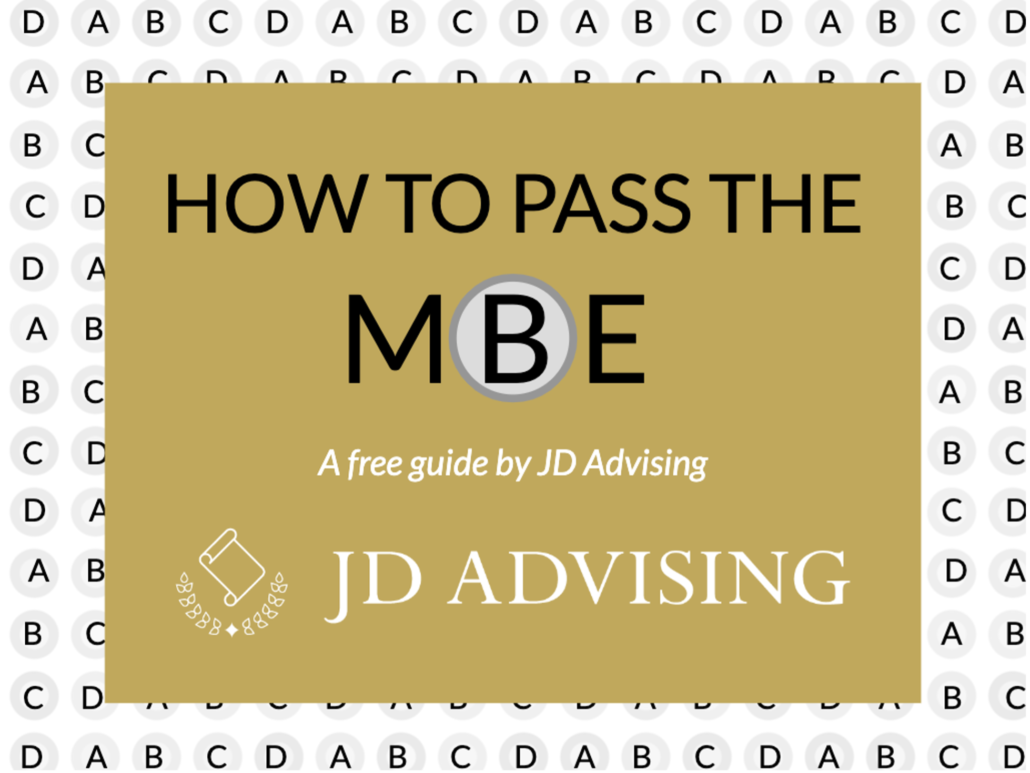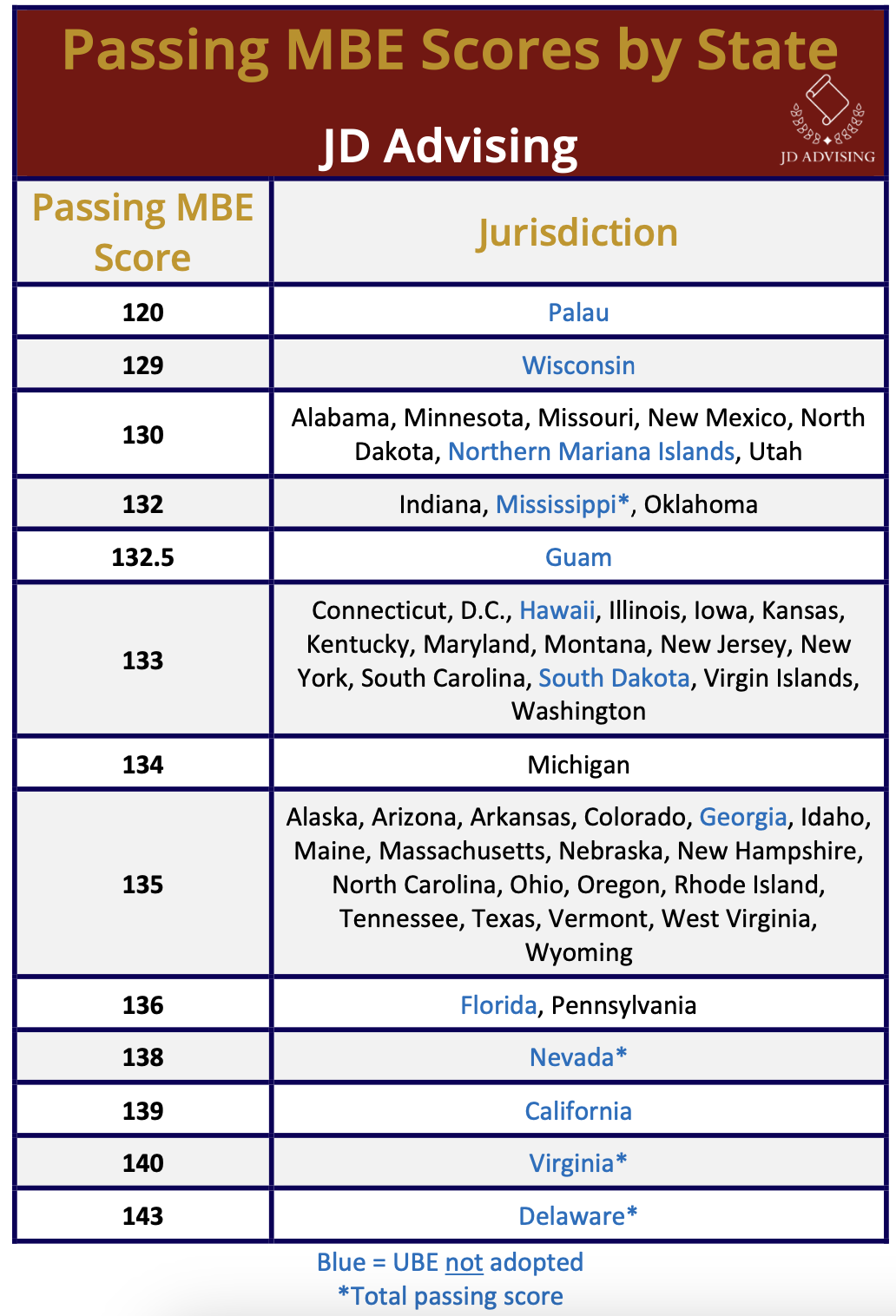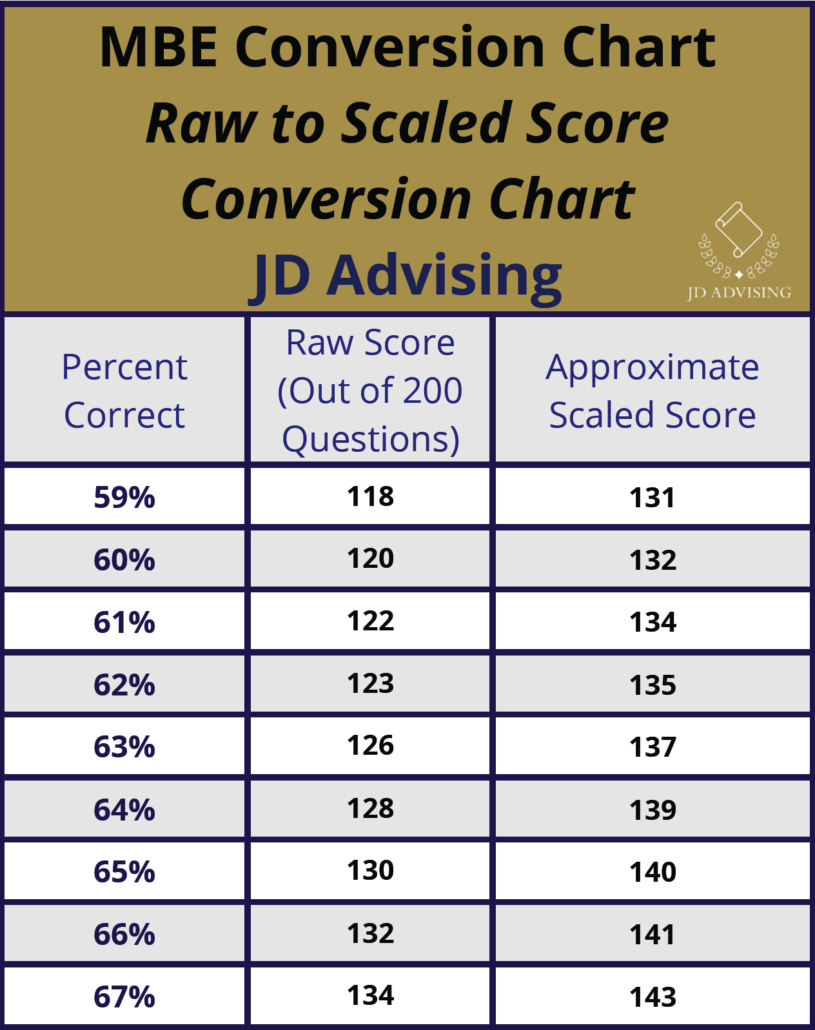Topic 2: How Is the MBE Scored (And Why Does It Matter?)

Topic 2: How Is the MBE Scored (And Why Does It Matter?)
Here we tell you what a passing MBE score is and what that really means in terms of the score you need to get to pass the MBE. Hint: you actually do not need to score that high to get a “passing” MBE score. And in many states, you can fail the MBE and still pass the bar exam. This is of course not to deter you from taking the MBE seriously! But it is to say that if you fall a few points shy of your goal score, it does not necessarily mean you will fail the bar exam!
What Is a Passing MBE Score?
The MBE score that is considered “passing” is set by each jurisdiction. The table below will tell you what a passing MBE score is.
Note that most jurisdictions do not have a “minimum” MBE score that you must receive to pass the exam. (So, in theory, a higher score on the written portion could make up for a lower MBE score.) There are some exceptions to this—for example, South Dakota requires a minimum score of 133. And Palau requires a minimum score of 120. You can read more about this here.

I Perform Poorly on Multiple-Choice Exams. What Do I Do?
The good news: You will never have to answer a multiple-choice question in real life. We have never heard of situation where a judge or opposing counsel asked a question in multiple-choice format.
The bad news: You do have to answer multiple-choice questions on the bar exam. There are 200 of them and they make up half your bar exam score in a Uniform Bar Exam jurisdiction.
The good news about the bad news: You do not have to score high on the MBE to pass. You need approximately a 62–64% of the questions correct to “pass” the multiple-choice. This is probably the first time in your life that you will be content—no, ecstatic—with the equivalent to a grade of a D! (This is discussed next!)
Further, as is mentioned above, in the vast majority of states (including Uniform Bar Exam states) you do not need to even technically “pass” the MBE to pass the bar exam. You can technically score lower than passing on the MBE and make up for it with a high essay score. More on that later. In the meantime, keep reading this guide and we will help you get your MBE score up!
How Is the MBE Scored?
The MBE is scored on a scale that can range from 40 (low) to 200 (high). Raw MBE scores (i.e., the number you actually got correct out of the 175 scored MBE questions) are scaled using a statistical process called equating which is supposed to account for the difference in difficulty between exams. For example, if an exam is difficult in comparison with a prior exam, more points will be added to an examinee’s raw score.
The converted score is what is released to examinees. Raw scores are no longer released to examinees. (If you would like to see a detailed chart on how to convert a raw score into a scaled score, you can read more about how to convert a raw score into a scaled score here.) However, it is not necessary to understand this level of detail in order to understand what a passing MBE score is for you, so, we will get right to the point!
If you are answering about 124 to 130 questions correctly out of 200 (62–65%), then you are probably getting a passing score.
Here is how you can figure out more precisely what a passing score is for you.
So, Is My MBE Score Passing?
First, figure out what a passing MBE score is in your state.
The first step is to see what converted score you need to pass the MBE. If you are in New York, for example, you need a 266 to pass the bar exam and a 133 to have a passing MBE score. (Though, as we note above, most jurisdictions, including Uniform Bar Exam jurisdictions, do not require a minimum passing MBE score. So long as you receive 266 points total, you will pass!) However, it is still helpful to know the approximate score that’s considered passing on the MBE so you know if you are on track.
Remember that the MBE score you just looked up is a “converted” MBE score.
So, if you are in New York, you know that a 133 is a “passing” MBE score. However, this is a passing converted MBE score. The NCBE calculates your “converted” MBE score by adding a certain number of points to your “raw” MBE score.
In other words, you do not need to answer 133 questions correct out of 200 (or out of the 175 questions that are scored on the MBE) to pass the MBE. What matters for your purposes is the “raw” score that you need. This score will tell you the approximate percentage of MBE questions that you need to answer correctly to pass the MBE.
Next, figure out the “raw” MBE score that you need in order to get that passing converted score.
The next step is to figure out the raw score that you need to get a passing converted MBE score. We have done the math for you based on past data that we have available.
These are the approximate scores you want to aim for to get a passing MBE score:
- If you are aiming for an MBE converted score of 131–135 (which is a passing score in most jurisdictions that require scores of 262–270 to pass), you should aim for 58%–62% of the questions correct on the MBE. We suggest aiming for at least 60% to be safe. This means you should get 60–62 questions correct on a 100-question practice test or 120–124 questions correct on a full (200-question) MBE exam.
- If you are aiming for an MBE score of 136–140 (which is a passing MBE score in jurisdictions that require a 272–280 to pass) you should aim for 62%–65% of the questions correct on the MBE. This means you should get 62–65 questions correct on a 100-question practice test or 124–130 questions correct on a full MBE exam.
So, as a general rule, if you are answering somewhere between 60% and 65%, your MBE raw score is in the “passing zone” depending on the jurisdiction you are in.

Go to the next topic, Topic 3: MBE Frequency Chart: Highly Tested MBE Topics
Seeking MBE Assistance?
Seeking MBE Assistance?
- 📘 MBE Guide: Equip yourself with our FREE expert-crafted bar exam and MBE guides.
- Free Bar Exam Resource Center: Discover top resources, articles, and free webinars led by renowned bar exam professionals.
Top Resources as Vouched by our Students:
- MBE One-Sheets: One of our most highly acclaimed bar exam supplements!
- Bar Exam Outlines: Our comprehensive and condensed bar exam outlines present key information in an organized, easy-to-digest layout.
- MBE Private Tutoring: Opt for personalized, effective strategies.
- On Demand Bar Exam Course: Comprehensive bar exam preparation.
- Bar Exam Crash Course and Mini Outlines: Acclaimed and effective for a quick refresher.
- MBE Mastery Class, Real MBE Questions, and MBE Guide: Elevate your MBE preparation with these high-quality MBE supplements!
🔥 NEW! Check out our Repeat Taker Bar Exam Course and get introduced to our unmatched platinum Guarantee Pass Program.





Leave a Reply
Want to join the discussion?Feel free to contribute!